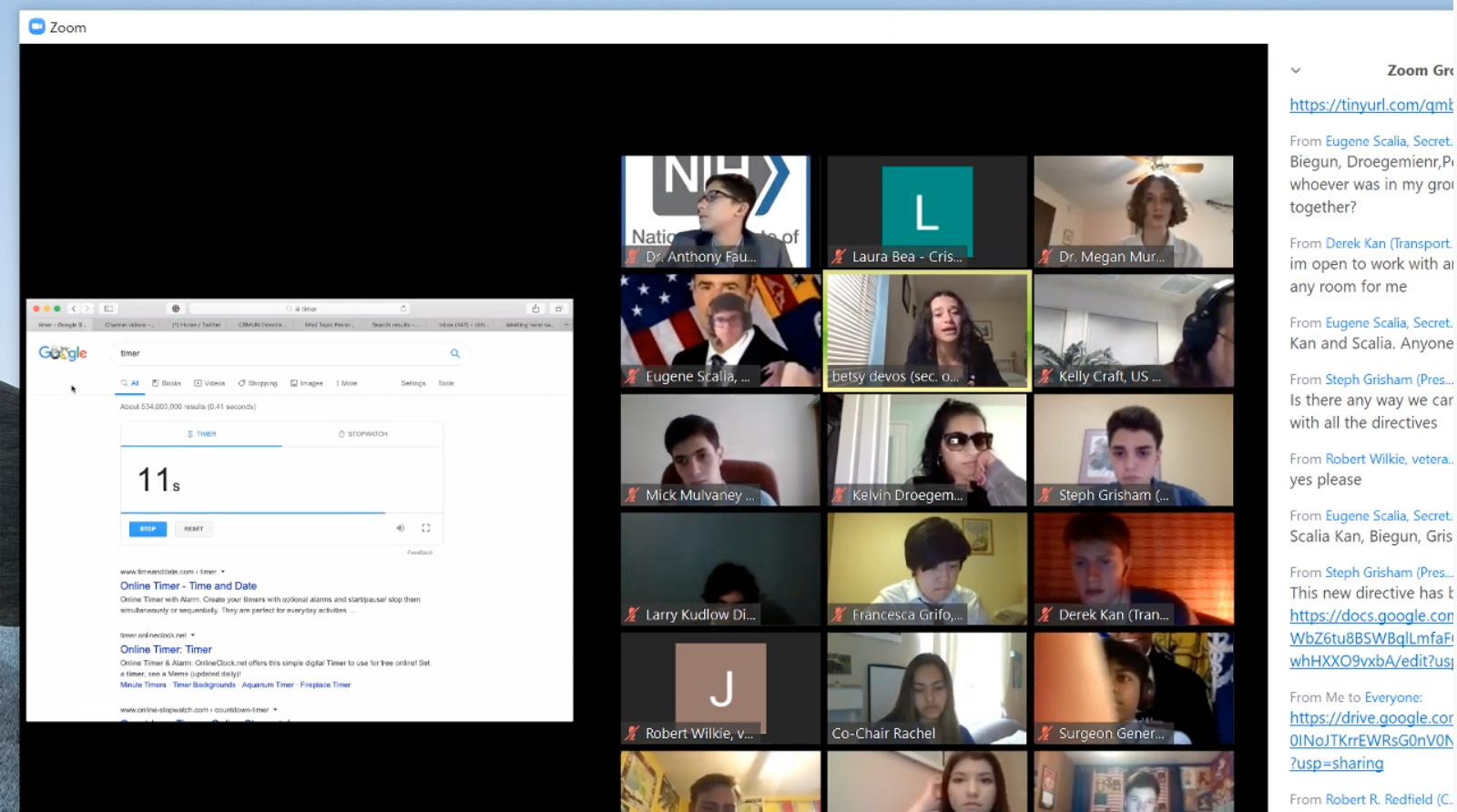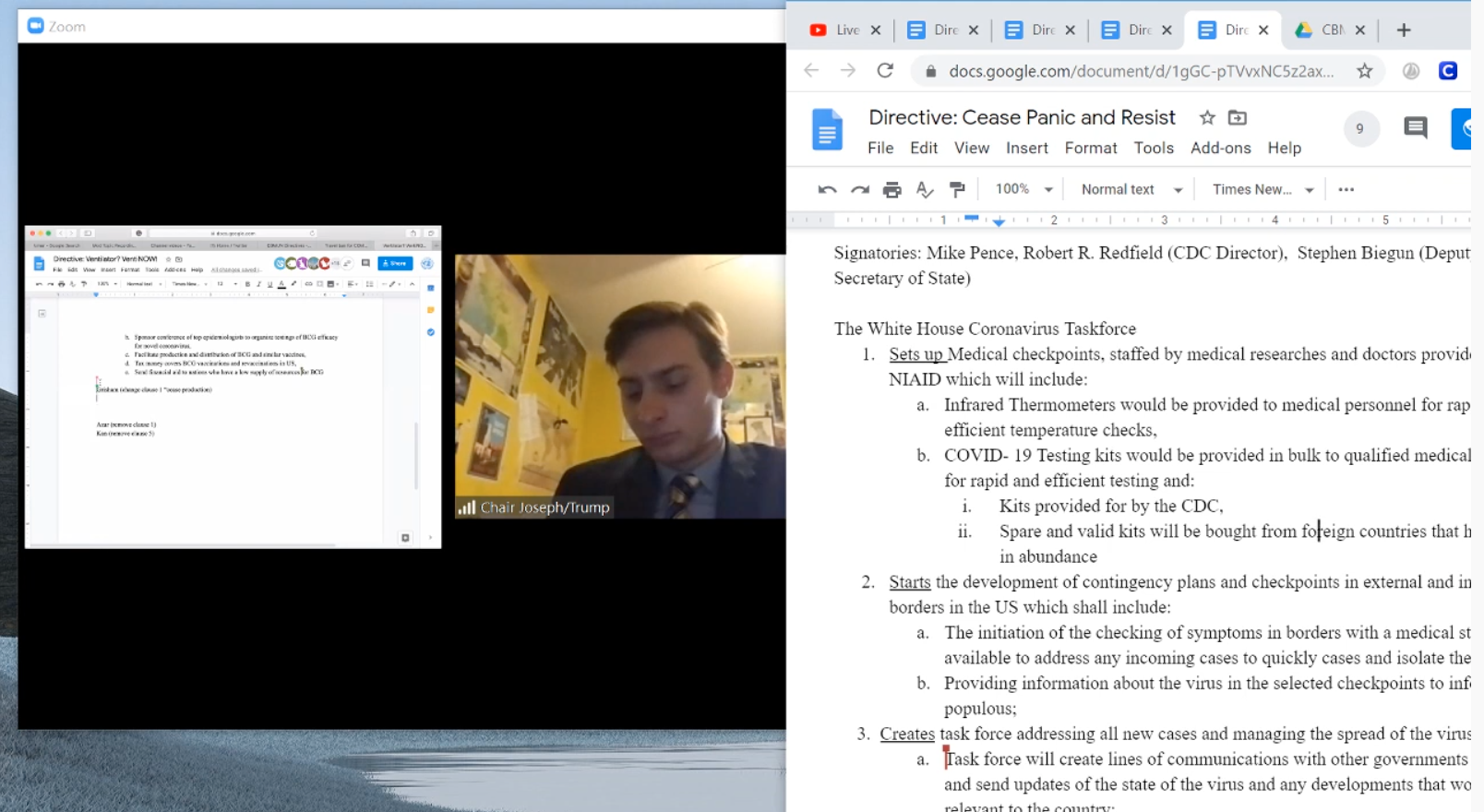This guest article was provided by the Cypress Bay MUN Team, including Joaquin Amigorena, Andrea Angulo, Laura Bea, Ian Cahen, Rachel Cevallos, Marek Kong, Joseph Mullen, and Joey Ruth.

CBHS MUN Officers Parker Repp, Ryan Ames, Mateo Fermin, Marek Kong, Joseph Mullen, Joaquin Amigorena, Rachel Cevallos, Laura Bea, and sponsor Timothy Petraitis.
On March 21st, Cypress Bay High School’s Model UN Team hosted a virtual MUN Conference, entirely on the Zoom video conferencing platform. In almost a poetic way, this novel concept was conceived true to the spirit of the United Nations; a cluster of ideas from many different voices stitched together by the forces of cooperation – united by a passion to discuss pressing world issues and identify their solutions. And the issue we addressed in this committee, the novel coronavirus outbreak, is the exact reason we have had to shift to this unique way of hosting conferences.
This outbreak has affected the Model UN community in so many ways. All across the planet, delegates have had their conferences cancelled. For Model UN delegates, social distancing is the opposite of our extroverted desire to meet new friends and form connections in our committees. We were lucky to invite delegates from all over the world, from countries such as Romania, Turkey, the UK, and India, and from right here in South Florida, to this conference, so that we could break the isolation many of us feel and unite with what all Model UN delegates have in common: a desire to save the world.
Our committee, appropriately, saw delegates fill the roles of members of the White House Coronavirus Task Force. Right now, as officials fight to contain this pandemic and protect civilians, delegates got to step into their shoes and propose solutions to the virus while learning about American economic and healthcare policy, as well as navigating the politics of the Trump administration. They also saw a variety of crisis updates produced by us, from the President’s live tweeting to our secretariat members speaking their native languages in updates. Delegates passed a variety of solutions in directive form, such as ordering American companies to produce ventilators and hospital equipment, preparing contingency plans across the United States, establishing a merchant marine and Air Force, coordinating the dissemination of factual information about the pandemic to the American people, restoring educational opportunities to American students displaced by the coronavirus, and discovering the vaccine with help from the International community before time ran out.

In order to execute this comittee in the way that we did, we relied heavily on all the functions made available by the Zoom application. As a substitution for placards, the raise hand function was used to call on delegates, and delegates sent notes to one another using Zoom’s chat function, which allows you to send private messages to other participants on the call. We made heavy use of Zoom’s fantastic screen sharing feature, which let us display our own screens as the chairs. We timed delegates using the Google Timer function, displayed on our screens. We put delegates’ directives on the screen, and then read them aloud for everyone. Delegates shared pdfs of their directives to gain signatories and sponsors.
To simulate unmoderated caucuses, we had delegates choose their blocs and then used Zoom’s resourceful breakout room feature to split delegates up into breakout room unmods. We monitored every breakout room to ensure delegates were cooperating in their rooms. We also used the screen sharing function to display our crisis updates on Youtube and through Twitter. Delegates conducted their speeches through Zoom, and we spotlighted the current person speaking so that all delegates could pay attention to the person currently speaking.

The out-room component of the virtual conference was managed through our team’s Gmail account. Delegates would both receive and write their notes through individual emails, establishing a system that guaranteed swift and efficient response. In addition to his, we created multiple pre-prepared videos – along with tweets made by our fake Donald Trump twitter account – to present our crisis updates. Video production softwares, namely iMovie, were utilized in the production of these crisis updates. The crisis staff, and other members of the secretariat, were responsible for the filming and editing of the crisis updates, in order to replicate a realistic, involved, and entertaining aspect of a crisis conference. If anything, our team found a way to enhance the out-room experience of this committee by utilizing virtual appliances.
In a multitude of ways, this committee is an embodiment of what is needed in these dire circumstances. With a pandemic raging on the world stage, it is crucial to stir conversation about how individuals, nations, and governments can foster cooperation and unite in common cause. In situations where many will reel into selfish desires, it is of utmost importance to reemphasize and preserve the values of camaraderie, altruism, and diplomatic resolve. This is an example of how the MUN community will always adapt to the perplexing obstacles that stand in its way. As part of this virtual conference, we encouraged all participants to donate to the World Health Organization Solidarity Fund for COVID-19. We urge everyone who participates in Model UN to continue to stand up for what’s right, even if it’s in isolation.
Check out Cypress Bay’s Youtube channel and Instagram for more info on their upcoming virtual Model United Nations simulations!


